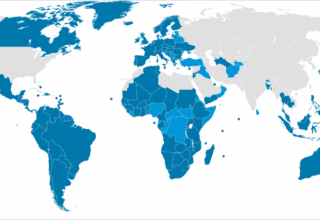
The special relationship between the United States and the United Kingdom has experienced different periods of closeness but also of more distance. Nonetheless, one of the moments, which have extremely influenced this relationship is the signing of the original Atlantic Charter, as it was the structural document, which enabled this transatlantic relationship to be created. The importance of this charter is also derived from the moment in which President Franklin Delano Roosevelt and Prime Minister Winston Churchill signed this deal, as it was during World War II and it showcased the clear intention of these two powers to work together during this very difficult time, defending their common democratic values against totalitarian regimes, like Nazi Germany (Marshall, 2021; Wintour, 2021).
The original Atlantic Charter was based on various key elements, which would continue to become extremely influential for the development of the world after the end of World War II, like the promotion of an international system that would allow self-determination, as well as that would champion the removal of trade barriers, the freedom of the seas, disarmament and peace. Such an agreement was able to be achieved in part because neither the US nor the UK had the goal of obtaining territorial gains once the war was over, which came as a direct contrast with the situation during and the First World War (Marshall, 2021). Nevertheless, the Atlantic Charter was a document that significantly influenced the outcome of the war and the developments that happened after it, since it has been widely argued that it was the stepping-stone for the creation of organisations like the United Nations and NATO. Not only that but, it was also crucial for the decolonisation movements that appeared after the war and the proliferation of trade arrangements (Marshall, 2021; Wintour, 2021).
The original Atlantic Charter is a great example of what cooperation between powerful nations can accomplish. Therefore, the important new challenges that the world is facing have led to an agreement between President Joe Biden and Prime Minister Boris Johnson for a new Atlantic Charter between the two countries. This decision has been influenced by various factors. Firstly, the main challenge that has prompted this renewal in the close relationship between the US and the UK has been the notable increase of power and assertiveness of China. Experts have considered that the Chinese challenge is a much more complex one than the Soviet challenge was during the Cold War, mainly since both the US and the UK are very closely connected economically with China, thus making any possible face-off, economically risky for these countries (Marshall, 2021). Nonetheless, this has not stopped, particularly the US from showcasing their willingness in standing up to China. This is greatly exemplified in the recent attempts by the US to reinforce its alliances with countries like Canada or Australia, as well as looking for new allies to showcase a united front against this new challenge (Marshall, 2021).
The other main event that has promoted the necessity for a new Atlantic Charter is the outbreak of the Covid-19 pandemic and the effects that it has left on the world. Even the UN Secretary-General António Guterres has already stated that this pandemic has resulted in the most difficult crisis that the world has experienced since World War II and Henry Kissinger even argued that the world will never be the same after this pandemic, thus showcasing the imperative need for actions, like the agreement on a new Atlantic Charter. This is in part because the Covid-19 pandemic has enabled the autocratic regimes in the world to further increase their dominance in their home countries, as well as it has shifted the approach of every country, as all of them have decided to act in a much more selfish manner, as cooperation between countries has experienced an abrupt stop. The Covid-19 pandemic has also accelerated an ideological competition between democracies and authoritarian regimes, where the goal is showcasing which, one is better equipped for facing major challenges like this pandemic. Not only that, but this pandemic has also given China the opportunity for further increasing their power abroad, for instance by portraying itself as an effective and generous power during these difficult times (Fontaine, 2020). These examples clearly exemplify the need for increased cooperation between countries like the US and the UK, which is for instance depicted by a statement by Downing Street where they clearly argued the importance of this new Atlantic Charter “just as our countries worked together to rebuild the world following the second world war, so too will we apply our combined strength to the enormous challenges facing the planet today – from global defence and security to building back better from coronavirus to stopping climate change” (Wintour, 2021).
This new Atlantic Charter, which has been announced by President Biden and Prime Minister Johnson shows their commitment for preserving their common values, like democracy, a rules-based world order and open societies, as it states that its first aim is to ensure that democracies have the ability for ‘solving the critical challenges of our time’ (Marshall, 2021; Brotman, 2021). Nonetheless, this new charter is based on eight major common challenges, which include cyber-attacks, the climate crisis, protection of biodiversity and preventing future pandemics. Not only that, but in the charter, there is also the commitment of protecting the Good Friday Agreement, as well as to consider the opening of air travel to the US and of a pandemic forecasting centre (Marshall, 2021; Wintour, 2021). Johnson clearly argued for the importance of this agreement when he stated “while Churchill and Roosevelt faced the question of how to help the world recover following a devastating war, today we have to reckon with a very different but no less intimidating challenge – how to build back better from the coronavirus pandemic” “and as we do so, cooperation between the UK and US, the closest of partners and the greatest of allies, will be crucial for the future of the world’s stability and prosperity” “the agreements President Biden and I will make [Thursday], rooted as they are in our shared values and outlook, will form the foundation of a sustainable global recovery. Eighty years ago, the US president and the British prime minister stood together promising a better future. Today we do the same” (Ellyatt, 2021; Johnston, 2021; Wintour, 2021).
What is more, the new Atlantic Charter clearly states the imperative need for enhancing the collective defences and providing a starting point for closer cooperation within their health systems, as a measure of prevention against any future pandemic, thus dismissing the model that authoritarian countries like China advocate for. Instead, this new Atlantic Charter defends a multilateralist project, which encourages cooperation between allies, therefore ensuring that governments not only seek the protection of their citizens but also of their allies (Brotman, 2021). Some experts have defended the new Atlantic Charter as an important defence of democratic values and international institutions in a time where the trend is going the opposite way with undemocratic powers increasing their strength (Farr, 2021). Nonetheless, there are still some, which argue that even though this has been a positive step forward, it will not achieve any noticeable changes unless both the US and UK are able to bring other countries into this renewed relationship. Daniel Fried, Weiser Family distinguished fellow and former US assistant secretary of state for Europe and Eurasia argued that “the US and UK can’t shape the world as they did after World War II,” thus they need to convince like-minded countries to adopt their viewpoint. Ash Jain senior fellow overseeing the Scowcroft Center’s Democratic Order Initiative and former member of the secretary of state’s policy planning staff also stated that “to succeed, such a charter will need to have the support of a broader group of democracies.” Fried also argued that even though this new Atlantic Charter has been an important step for changing the already mentioned trend of undemocratic governments developing their strength there is still much work to be done as he pointed out that “Joe Biden has stressed that he wants democracies to come together, start fixing their (and global) problems, and thus better contend with the despots who argue that their time has come. The Atlantic Charter 2.0 is not the answer. But it’s a good beginning of an answer and, hopefully, the beginning of a good week for a democratic comeback” (Atlantic Council, 2021).
Furthermore, although this new Atlantic Charter showcase the intension of solidifying the relationship between the US and the UK there are still some challenges, which can affect the relationship between these two countries, particularly Brexit and how the UK and the European Union will implement the Northern Ireland protocol. This is notably, due to the fact that President Biden has made it repeatedly clear that he sees the maintenance of the Good Friday Agreement as crucial for a good relationship with the UK. A member of the US´s expedition clearly stated on Air Force One to reporters that “any steps that imperil it or undermine it would not be welcomed by the United States” (Shabad and Smith, 2021; Khalid, Langfitt and Ordoñez, 2021).
In conclusion, it is very clear that the world has dramatically changed since 1941 when the original Atlantic Charter was signed. Nevertheless, recently some challenges and events have appeared that have altered the view that we had from the world, as it is incredibly difficult to determine the shape that international relations will adopt once the Covid-19 pandemic is over. However, even though the new Atlantic Charter may have flaws and may need to include more countries than just the US and the UK, it is very clear that it is a very positive step forward, particularly for the defence of important values like the democratic ones (Fontaine, 2020; Wintour, 2021).
Bibliography:
- Marshall, A.R. 2021. That was then but this is now: Assessing the new Atlantic Charter. Atlantic Council.
- Atlantic Council. 2021. FAST THINKING: The world has a new Atlantic Charter.
- Wintour, 2021. US-UK to sign post-Covid Atlantic charter in echo of wartime accord. The Guardian. Retrieved on June 18, 2021, available at: https://www.theguardian.com/world/2021/jun/09/us-uk-to-sign-post-covid-atlantic-charter-in-hint-at-second-world-war
- Brotman, A. 2021. Opinion – A New Atlantic Charter for a New Age of Competition. E-International Relations. Retrieved on June 18, 2021, available at: https://www.e-ir.info/2021/06/15/opinion-a-new-atlantic-charter-for-a-new-age-of-competition/
- Shabad, R. and Smith, A. 2021. Biden, Johnson signs new Atlantic Charter on trade, defense amid Covid recovery. NBC News. Retrieved on June 18, 2021, available at: https://www.nbcnews.com/politics/white-house/biden-johnson-sign-new-atlantic-charter-trade-defense-amid-covid-n1270282
- Fontaine, R. 2020. We Need an Atlantic Charter for the Post-coronavirus Era. The Atlantic. Retrieved on June 18, 2021, available at: https://www.theatlantic.com/ideas/archive/2020/04/we-need-new-atlantic-charter/610069/
- Khalid, A., Langfitt, F. and Ordoñez, F. 2021. With An Eye To History, Biden And Johnson Try To Rekindle The ‘Special Relationship’ NPR. Retrieved on June 18, 2021, available at: https://www.npr.org/2021/06/10/1004531683/with-an-eye-to-history-biden-and-johnson-try-to-rekindle-the-special-relationshi?t=1623834639506
- Ellyatt, H. 2021. Biden and Johnson to agree on new ‘Atlantic Charter’ covering tech, trade and travel. CNBC. Retrieved on June 18, 2021, available at: https://www.cnbc.com/2021/06/09/biden-and-johnson-new-atlantic-charter-covering-tech-trade-travel.html
- Johnston, J. 2021. Boris Johnson And Joe Biden To Agree New ‘Atlantic Charter’ During US President’s Visit. PoliticsHome. Retrieved on June 18, 2021, available at: https://www.politicshome.com/news/article/boris-johnson-and-joe-biden-to-agree-new-atlantic-charter-during-us-presidents-visit
- Farr, M. 2021. With new Atlantic Charter, Biden and Johnson reset the special relationship. The Conversation. Retrieved on June 18, 2021, available at: https://theconversation.com/with-new-atlantic-charter-biden-and-johnson-reset-the-special-relationship-162567
By Alvaro Perez Cardenes, The European Institute for International Law and International Relations.















